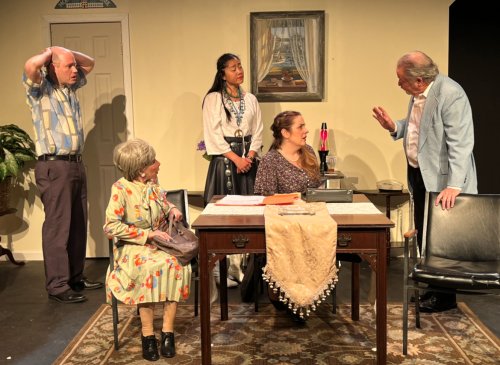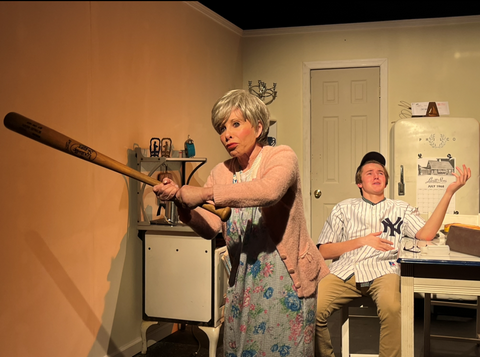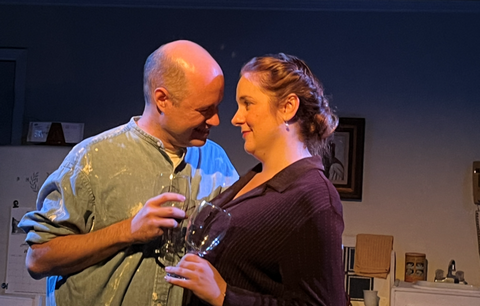A Tomato Can’t Grow in the Bronx
A working-class family is torn by divided loyalties and unfulfilled dreams.

The company of Gary Morgenstein’s “A Tomato Can’t Grow in the Bronx” at the Chain Theatre (Photo credit: Mateo Del Campo)
[avatar user=”Joel Benjamin” size=”96″ align=”left”] Joel Benjamin, Critic[/avatar]
Gary Morgenstein’s A Tomato Can’t Grow in the Bronx at the Chain Theatre is a kitchen sink comedy/drama in the manner of the far superior and more subtle Clifford Odets who early in his career focused on the woeful tales of Depression Era middle and working class Jewish families (Awake and Sing!, Paradise Lost).
In Tomato two related Jewish families live close to each other in the Bronx in June of 1968. (Period-appropriate pop songs fill the theater before the curtain and during the intermission.) The slightly grander flat belongs to Harry and Gladys Simms (Jackie Kusher and Andrea Bell Wolff) who are the parents of Eleanor Abrams (Holly O’Brien) who is married to Sammy Abrams (Mike Roche). Their teenage son is Elliot (Spencer Neumann).
The Abrams’ loyalty is divided. Eleanor believes her father Harry can do no wrong while young Elliot hangs with his sardonic, overly-protective grandmother, Gladys. Poor Sammy is a schlemiel caught between the two factions, not helped by the fact that he works for a pittance at his father-in-law’s wallpapering business.

Andrea Bell Wolff as Gladys and Spencer Neumann as Elliot Abrams in a scene from Gary Morgenstein’s “A Tomato Can’t Grow in the Bronx” at the Chain Theatre (Photo credit: Mateo Del Campo)
At the play’s opening, Elliot is being nursed by his grandma Gladys for a bleeding wound on his forehead delivered by a neighborhood thug, a Black teen. Grandpa Harry promises to use his connections to find the perpetrator which he does with unexpected results.
This scene reveals the pecking order of the family with cantankerous Harry on top and Sammy quite definitely at the bottom.
Sammy has visions of life in the suburbs and a business of his own, both pipe dreams out of his reach unless Harry offers to help. Elliot wants to be a sportscaster and carries a fake microphone everywhere he goes frequently coming forward to make faux announcements that turn his life into an unending baseball game. These interludes of Elliot making like a radio host quickly become irritating, not helped by Neumann’s overacting.
The second act brings the family to a new community out in Long Island where all their long-hidden issues come to the fore as they discuss the pros and cons of leaving the Bronx—where no tomato plant can survive on a fire escape—for the then fertile fields of Huntington. They are shepherded through this lovely model house—perfectly adequate, evocative scenery by Bernice Garfield-Szita and Bob Szita—by Madeline Kramer (a slightly miscast, but energetic Marina Chan).

Mike Roche as Sammy and Holly O’Brien as his wife Eleanor in a scene from Gary Morgenstein’s “A Tomato Can’t Grow in the Bronx” at the Chain Theatre (Photo credit: Mateo Del Campo)
Under the permissive direction of Garfield-Szita—who also designed the costumes—the cast comes across more as members of a sitcom than a serious drama, not helped by Morgenstein’s dependence on shtick and clichés.
The actors work hard to find some emotional resonance in their dialogue, particularly Kusher, O’Brien and Roche who occasionally rise above their lines. Bell Wolff as Gladys is in a world of her own. Her voice is a colorful instrument that takes Tomato into an almost surreal place.
Morgenstein does have a good feel for what drives each of his characters. A sweet scene on a fire escape between Eleanor and Sammy shows that the playwright can be subtle and incisive.
A Tomato Can’t Grow in the Bronx is earnest, indulgent but well-meaning, just not skillfully rendered.
A Tomato Can’t Grow in the Bronx (through December 17, 2022)
Chain Theatre, 312 West 36th Street, 4th floor, in Manhattan
For tickets, visit http://www.brownpapertickets.om
Running time: two hours including one intermission






Leave a comment